Fleurs du Mal Magazine



Robert Burns
(1759–1796)
A Fond Kiss
A fond kiss, and then we sever;
A farewell, and then forever!
Deep in heart-wrung tears I’ll pledge thee,
Warring sighs and groans I’ll wage thee.
Who shall say that Fortune grieves him,
While the star of hope she leaves him?
Me, nae cheerfu’ twinkle lights me;
Dark despair around benights me.
I’ll ne’er blame my partial fancy,
Nothing could resist my Nancy;
But to see her was to love her;
Love but her, and love forever.
Had we never lov’d say kindly,
Had we never lov’d say blindly,
Never met–or never parted–
We had ne’er been broken-hearted.
Fare thee well, thou first and fairest!
Fare thee well, thou best and dearest!
Thine be like a joy and treasure,
Peace. enjoyment, love, and pleasure!
A fond kiss, and then we sever;
A farewell, alas, forever!
Deep in heart-wrung tears I’ll pledge thee,
Warring sighs and groans I’ll wage thee!
Robert Burns poetry
fleursdumal.nl magazine
More in: Archive A-B, Burns, Robert
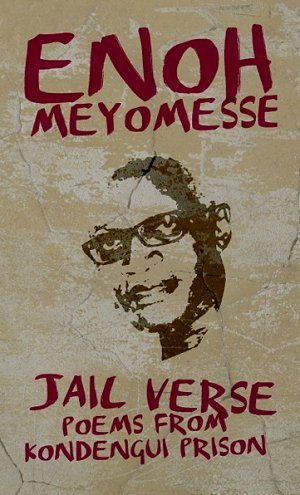
Enoh Meyomesse poetry e-Book published by English PEN
To mark this year’s Day of the Imprisoned Writer, English PEN is delighted to be publishing a crowd-sourced translation of Poème Carcéral : Poésie du pénitencier de Kondengui, a powerful collection of poems by Cameroonian writer and activist Enoh Meyomesse
Download Enoh Meyomesse poetry e-Book.
On 27 December 2012, Enoh Meyomesse was sentenced to seven years in prison on charges that are widely believed to be politically motivated. English PEN considers his incarceration to be in violation of his right to free expression and is calling for his immediate and unconditional release.
In April 2013, Meyomesse’s lawyers succeeded in having his case referred to a civil court for appeal. The Court of Appeal was due to call him for the first time on 20 June, but the hearing has since been postponed several times. As a result, Meyomesse has spent a further five months in prison. In spite of this, he remains in good spirits and continues to write prolifically, despite having been denied access to the computer room, and is greatly encouraged by English PEN’s ongoing support.
In order to raise much-needed funds for Enoh Meyomesse and his family and greater awareness of his case, English PEN has been working with some fantastic volunteer translators on a crowd-sourced translation of his prison poetry. The collection, Jail Verse: Poems from Kondengui Prison, is now (febr. 2014) available to download.
You can download the e-book for free, but we’d be hugely grateful if you are able to donate £5, or whatever you can afford. All proceeds will be used to support Enoh Meyomesse and his family, and the ongoing work of our Writers at Risk Programme.
(NB. A print-on-demand version will be available very soon. If you would like to be notified once it is, please email cat@englishpen.org)
Enoh Meyomesse
From the poem: The earth had stopped turning
(…)
Despair
you visited me during that day
and the black night,
without stars without moonbeams
without fireflies without future
you could cut it with a machete
like the night when
my feet
lost their way behind
the village hut
I, who surrendered there beneath the cocoa trees
where the elephant rots
oh God in heaven
inky
darkness
beat down on me
(…)
Translated by Grace Hetherington
#Download here your copy! #Visit website English PEN
fleursdumal.nl magazine
More in: - Book News, Archive M-N, Art & Literature News, REPRESSION OF WRITERS, JOURNALISTS & ARTISTS

Thomas Chatterton
(1752-1770)
Song from Ælla
SING unto my roundelay,
O drop the briny tear with me;
Dance no more at holyday,
Like a running river be:
My love is dead,
Gone to his death-bed
All under the willow-tree.
Black his cryne [1] as the winter night,
White his rode [2] as the summer snow,
Red his face as the morning light,
Cole he lies in the grave below:
My love is dead,
Gone to his death-bed
All under the willow-tree.
Sweet his tongue as the throstle’s note,
Quick in dance as thought can be,
Deft his tabor, cudgel stout;
O he lies by the willow-tree!
My love is dead,
Gone to his death-bed
All under the willow-tree.
Hark! the raven flaps his wing
In the brier’d dell below;
Hark! the death-owl loud doth sing
To the nightmares, as they go:
My love is dead,
Gone to his death-bed
All under the willow-tree.
See! the white moon shines on high;
Whiter is my true-love’s shroud:
Whiter than the morning sky,
Whiter than the evening cloud:
My love is dead,
Gone to his death-bed
All under the willow-tree.
Here upon my true-love’s grave
Shall the barren flowers be laid;
Not one holy saint to save
All the coldness of a maid:
My love is dead,
Gone to his death-bed
All under the willow-tree.
With my hands I’ll dent the briers
Round his holy corse to gre [3]:
Ouph [4] and fairy, light your fires,
Here my body still shall be:
My love is dead,
Gone to his death-bed
All under the willow-tree.
Come, with acorn-cup and thorn,
Drain my heartès blood away;
Life and all its good I scorn,
Dance by night, or feast by day:
My love is dead,
Gone to his death-bed
All under the willow-tree.
1 cryne – hair
2 rode – complexion
3 gre – grow
4 ouph – elf
Thomas Chatterton poetry
fleursdumal.nl magazine
More in: Archive C-D, Thomas Chatterton

Joep Eijkens
Poëzieweek in Tilburg: gratis gedichten bij de Voedselbank
Af en toe zie je in Tilburg een militairgroene bus rijden met daarop de woorden Theater van de Verloren Tijd. Onder die mooie naam brengen Sjon Brands (1948) en Dorith van der Lee (1958) al vele jaren een voortdurend wisselend programma van Nederlandse, Vlaamse en Zuid-Afrikaanse poëzie. ‘Wij kennen ieder ruim 600 gedichten uit het hoofd en kunnen daarmee overal op reageren’, meldt het duo op een wervende folder. ‘Wij bogen op ruim 20 jaar ervaring op podia en pleinen van Terschelling tot aan Kaap de Goede Hoop’.
Zo ver hoefden ze afgelopen vrijdagochtend niet te rijden. Ditmaal was de bestemming de Voedselbank in Tilburg-West. In het kader van de nationale Poëzieweek 2014 waren Sjon en Dorith daar neergestreken om de lange rij wachtenden te trakteren op koffie en, zo men wilde, een gedicht. Een welkome onderbreking als je een paar uur staat te wachten voor de bank open gaat. Natuurlijk stond niet ieders hoofd naar poëzie, maar sommigen genoten er zichtbaar en hoorbaar van. Zoals die ene vrouw die helemaal leek te gaan stralen bij een gedicht dat eindigde met ‘Ik hou van jou’. Onder de wachtenden bleken zich trouwens verschillende dichters te bevinden. “Ik heb al vier boeken geschreven”, riep een vrouw. “Maar dat is een heel verhaal”. Ongetwijfeld.



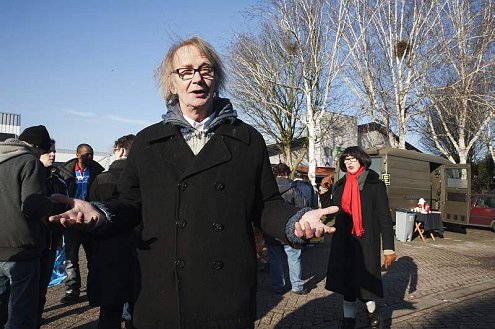
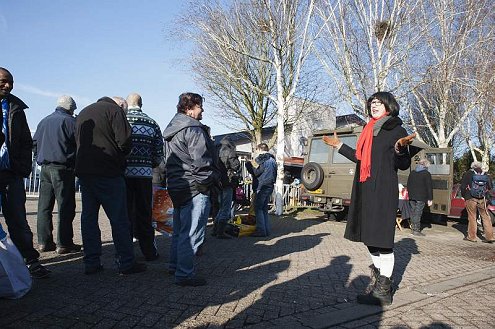


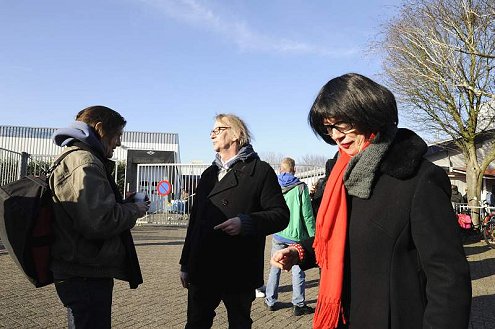

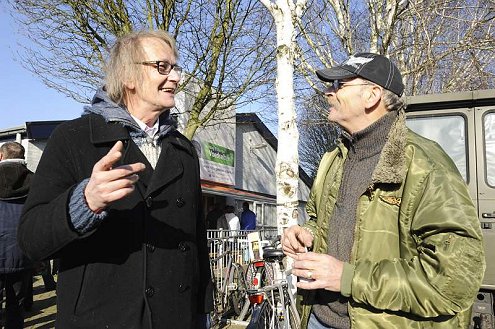

joep eijkens photos & text
fleursdumal.nl magazine
More in: Brands, Sjon, Joep Eijkens Photos, Poëzieweek, Theater van de Verloren Tijd

Willy Martin gedicht & Heilna du Plooy vertaling
Literaire Salon in’t Wevershuisje
Vertaalvrucht 2
Willy Martin
EEN HERFST AAN ZEE
Zij twijfelt nog.
Zij aarzelt, even.
Zij is niet zeker
van wat komen zal:
dagen van mist allicht,
van strakke wind,
van eindeloze regen.
Later die dag
komt zij hem in de duinen tegen.
Geborgen in een warme kuil
geniet hij van wat late zon.
Als hij haar ziet en nader komt,
is zij niet langer meer onzeker.
Alsof zij altijd had geweten
dat eens, een herfst aan zee,
het haasten in zijn hoofd
voorgoed zou zijn verdwenen.
Willy Martin
gedicht uit: Voor de Gelegenheid (Academia Press, Gent, 2011, p.16)
Willy Martin
EEN HERFS BY DIE SEE
Sy twyfel nog.
Sy aarsel, ietwat.
Sy is nie seker
oor wat voorlê nie:
dae van mis miskien,
van gure wind,
van eindelose reën.
Later die dag
kom sy hom in die duine teë.
Geborge teen die warm sand
koester by hom in die aandson.
As hy haar sien en nader kom,
is sy nie meer onseker nie.
Dit was of sy nog altyd weet:
eendag, een herfs by die see,
gaan die gejaagheid in sy kop
hom vir altyd verlaat.
Vertaling naar het Zuid-Afrikaans door Heilna du Plooy
Gedicht en vertaling uit: Tijdschrift Ambrozijn, 31ste jaargang, nummer 3, 2013-2014, p. 26-27
fleursdumal.nl magazine
More in: Heilna du Plooy, Literaire Salon in 't Wevershuisje, Willy Martin

Ton van Reen: Katapult, de ondergang van Amsterdam (06)
`Ik begrijp er geen barst van’, zei Bas hoofdschuddend. `Toen de eerste witte muizen hier arriveerden, was je zelf een en al vriendelijkheid. Ik kan me nog herinneren hoe jullie met z’n allen hun eerste nest bewonderden.’
`Dat klopt’, gaf Kaspar toe. `En tegen hun tweede nest had ik ook niks. Maar nu ze met steeds meer zijn, eisen ze een steeds groter deel van de kaas op. Als het zo doorgaat, groeien ze ons binnen de kortst mogelijke tijd boven het hoofd.’
`Je zou eerder medelijden met míj moeten hebben’, zei Bas. `Ik moet jullie allemaal aan het bikken houden. Elke week tien hele kazen. En uit dank vreten jullie het hout uit de deuren en de stoppen uit de bierleidingen. En alsof dat nog niet het ergste is, ligt er voortdurend een horde muizen op de loer bij de keuken. Zelf gap je het vlees van de broodjes. Hoe vaak heb ik je al gezegd dat ik mijn klanten niet wil bedienen met keutels op het bord. Ik heb mijn kont nog niet gedraaid of de muizen dansen op het aanrecht en kraken de ijskast. Ik weet niet of ik op deze manier de zaak nog lang kan openhouden. Dat naait maar door. Dat fokt maar raak. Elke zes weken een nest per paar.’
`Je bedoelt die witten’, zei Kaspar. `In elke kast waar je kijkt en in elke hoek liggen ze te rotzooien. Ze neuken op de tafeltjes, dat soort.’
`Ze voelen zich niet geremd door de aanwezigheid van anderen’, zei Bas. `Wat dat betreft zijn die witte muizen heel wat minder hypocriet dan jullie. Al heb jij toch ook uitstekend je best gedaan. Er rennen hier meer dan honderd zwarte muizen rond. Jij hebt een heel volk gesticht. Ik durf er niet aan te denken hoe dit aardige paradijs eruit zal zien als we een paar jaar verder zijn. Eigenlijk zou ik jullie de pil moeten geven.’
Kaspar keek hem nijdig aan, alsof hij wilde zeggen: waar bemoei jij je als buitenstaander mee.
`Ik moet toegeven’, zei hij nors, terwijl hij zijn vette snorharen reinigde, `dat er vernielers onder ons zitten. Maar dan hoef je nog niet direct met overdreven maatregelen te komen. Je moet het kwaad aanpakken waar het is. Het ligt niet aan ons, de zwarte muizen. Het zijn de witten. Moet je zien hoe ze rond de radio staan te springen. De hele dag gaat dat gejengel door. Van mij mag je ze er onmiddellijk uitlazeren.’
`Herenee’, riep Bas uit. `En ik dacht nog wel dat jullie muizen zo verdraagzaam waren. Zo anders dan mensen.’
`Hoe anders? Je bedoelt alleen kleiner.’
Ton van Reen: Katapult (06)
fleursdumal.nl magazine
More in: - Katapult, de ondergang van Amsterdam, Reen, Ton van
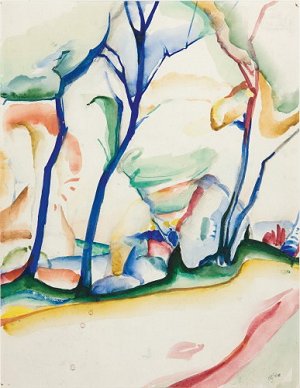
Alida Pott (1888-1931)
Tentoonstelling Met avantgardistisch elan:
De Ploeg in Groningen
Tot en met 2 maart 2014 is in het Groninger Museum de tentoonstelling Met avantgardistisch elan: De Ploeg in Groningen te zien
De Ploeg is de naam van de Groninger kunstkring die in 1918 werd opgericht. Jan Altink bedacht de naam van de kunstenaarsbent: het kunstleven in Groningen zou volgens hem eens flink omgeploegd moeten worden, om vervolgens tot ontkieming te komen. De naam bleek goed gekozen: de kunstenaars legden in de daarop volgende jaren een avantgardistisch elan aan de dag en stonden open voor de verwerking van uiteenlopende nieuwe invloeden.
Onder aanvoering van Jan Wiegers, die gedurende een gezondheidskuur in Davos in Zwitserland bevriend was geraakt met Ernst Ludwig Kirchner, ontstond een schilderkunst die in hoge mate schatplichtig was aan het Duitse expressionisme. Nieuw was dat de schilders van De Ploeg het weidse Groninger landschap tot een belangrijk onderwerp van hun kunst maakten. Daarmee ontstonden de karakteristieke landschappen met hoge horizonten en in de verte verdwijnende wegen en sloten. In expressionistische kleuren en verftoetsen gaven zij uitdrukking aan de uitgestrektheid en ruigheid van het Groninger land.
Behalve het landschap vormden ook het stadsleven en het portret belangrijke schilderkunstige motieven binnen De Ploeg. Met de portretten die de leden van elkaar maakten, bracht men de vriendschapsbanden binnen de kunstenaarskring artistiek tot uitdrukking. Daarnaast kende de kunstkring een constructivistische richting.
De tentoonstelling laat werken zien van onder anderen Jan Altink (1885-1971), Wobbe Alkema (1900-1984), Jan Wiegers (1893-1959), Johan Dijkstra (1896-1978), Job Hansen (1899-1960), Ekke Kleima (1899-1958), George Martens (1894-1979), Alida Pott (1888-1931), Jan Gerrit Jordens (1883-1962), Jannes de Vries (1901-1986), Hendrik Nicolaas Werkman (1882-1945) en Jan van der Zee (1898-1988).
# Website Groninger Museum voor meer informatie
fleursdumal.nl magazine
More in: Art & Literature News, De Ploeg, Dutch Landscapes, Expressionisme, Hendrik Nicolaas Werkman

Edmund Spenser
(1552-1599)
My Love Is Like To Ice
My love is like to ice, and I to fire:
How comes it then that this her cold so great
Is not dissolved through my so hot desire,
But harder grows the more I her entreat?
Or how comes it that my exceeding heat
Is not allayed by her heart-frozen cold,
But that I burn much more in boiling sweat,
And feel my flames augmented manifold?
What more miraculous thing may be told,
That fire, which all things melts, should harden ice,
And ice, which is congeal’s with senseless cold,
Should kindle fire by wonderful device?
Such is the power of love in gentle mind,
That it can alter all the course of kind.
Edmund Spenser poetry
fleursdumal.nl magazine
More in: Archive S-T, Spenser, Edmund

The Sorrows of Young Werther (08)
by J.W. von Goethe
26 May 1771
You know of old my ways of settling anywhere, of selecting a little cottage in some cosy spot, and of putting up in it with every inconvenience. Here, too, I have discovered such a snug, comfortable place, which possesses peculiar charms for me.
About a league from the town is a place called Walheim. (The reader need not take the trouble to look for the place thus designated. We have found it necessary to change the names given in the original.) It is delightfully situated on the side of a hill; and, by proceeding along one of the footpaths which lead out of the village, you can have a view of the whole valley. A good old woman lives there, who keeps a small inn. She sells wine, beer, and coffee, and is cheerful and pleasant notwithstanding her age. The chief charm of this spot consists in two linden-trees, spreading their enormous branches over the little green before the church, which is entirely surrounded by peasants’ cottages, barns, and homesteads. I have seldom seen a place so retired and peaceable; and there often have my table and chair brought out from the little inn, and drink my coffee there, and read my Homer. Accident brought me to the spot one fine afternoon, and I found it perfectly deserted. Everybody was in the fields except a little boy about four years of age, who was sitting on the ground, and held between his knees a child about six months old: he pressed it to his bosom with both arms, which thus formed a sort of arm-chair; and, notwithstanding the liveliness which sparkled in its black eyes, it remained perfectly still. The sight charmed me. I sat down upon a plough opposite, and sketched with great delight this little picture of brotherly tenderness.
I added the neighbouring hedge, the barn-door, and some broken cart-wheels, just as they happened to lie; and I found in about an hour that I had made a very correct and interesting drawing, without putting in the slightest thing of my own. This confirmed me in my resolution of adhering, for the future, entirely to nature. She alone is inexhaustible, and capable of forming the greatest masters. Much may be alleged in favour of rules, as much may be likewise advanced in favour of the laws of society: an artist formed upon them will never produce anything absolutely bad or disgusting; as a man who observes the laws, and obeys decorum, can never be an absolutely intolerable neighbour, nor a decided villain: but yet, say what you will of rules, they destroy the genuine feeling of nature, as well as its true expression. Do not tell me “that this is too hard, that they only restrain and prune superfluous branches, etc.” My good friend, I will illustrate this by an analogy. These things resemble love. A warmhearted youth becomes strongly attached to a maiden: he spends every hour of the day in her company, wears out his health, and lavishes his fortune, to afford continual proof that he is wholly devoted to her. Then comes a man of the world, a man of place and respectability, and addresses him thus: “My good young friend, love is natural; but you must love within bounds. Divide your time: devote a portion to business, and give the hours of recreation to your mistress. Calculate your fortune; and out of the superfluity you may make her a present, only not too often,–on her birthday, and such occasions.” Pursuing this advice, he may become a useful member of society, and I should advise every prince to give him an appointment; but it is all up with his love, and with his genius if he be an artist.
O my friend! why is it that the torrent of genius so seldom bursts forth, so seldom rolls in full-flowing stream, overwhelming your astounded soul? Because, on either side of this stream, cold and respectable persons have taken up their abodes, and, forsooth, their summer-houses and tulip-beds would suffer from the torrent; wherefore they dig trenches, and raise embankments betimes, in order to avert the impending danger.
The Sorrows of Young Werther (Die Leiden des jungen Werther) by J.W. von Goethe. Translated by R.D. Boylan.
To be continued
fleursdumal.nl magazine
More in: -Die Leiden des jungen Werther, Goethe, Johann Wolfgang von

Charles Guérin
(1873 – 1907 )
Epitaphe pour lui-même
Il fut le très subtil musicien des vents
Qui se plaignent en de nocturnes symphonies ;
Il nota le murmure des herbes jaunies
Entre les pavés gris des cours d’anciens couvents.
Il trouva sur la viole des dévots servants
Pour ses maîtresses des tendresses infinies ;
Il égrena les ineffables litanies
Ou s’alanguissent tous les amoureux fervents.
Un soir, la chair brisée aux voluptés divines,
Il détourna du ciel son front fleuri d’épines,
Et se coucha, les pieds meurtris et le coeur las.
Ô toi, qui, dégoûté du rire et de la lutte
Odieuse, vibras aux sanglots de sa flûte,
Poète, ralentis le pas : cy dort Heirclas.
Charles Guérin poetry
fleursdumal.nl magazine
More in: - Archive Tombeau de la jeunesse, Archive G-H, CLASSIC POETRY

POëZIEWEEK 2014
Poëzie in De Nwe Vorst (Tilburg) – Over de Schoonheid van Geweld op 5 februari 2014 Een ontmoeting met twee dichters, die elkaar ook net ontmoeten. Met God en het volk, met stront en angst, oorlogstrommels en halsbanden. Maar gelukkig ook met BOEM! en ding-a-dong.
Met: Carina van der Walt & Daan Taks # Tijdsduur: 15 a 20 minuten # Optredens om 13:30, 15:00 & 16:30 # Gast om 13:30 activiste Joke Kaviaar
theater de NWE Vorst # WillemII-straat 49 # 5038 BD tilburg
Carina van der Walt en Daan Taks Dichter in De NWE Vorst # Tilburgse dichters organiseren gedurende twee weken bijna dagelijks poëzie-evenementen in de Voorkamer van De NWE Vorst. Aanleiding is de Landelijke Poëziedag op 30 januari. Op woensdag 5 februari zijn Carina van der Walt en Daan Taks tussen 13 en 18 uur te gast in onze voorkamer.
fleursdumal.nl magazine
More in: Archive S-T, Archive W-X, Art & Literature News, Poëzieweek, Walt, Carina van der

Sir Walter Scott
(1771-1832)
“Proud Maisie”
Proud Maisie is in the wood,
Walking so early;
Sweet Robin sits on the bush,
Singing so rarely.
“Tell me, thou bonny bird,
When shall I marry me?”
“When six braw gentlemen
Kirkward shall carry ye.”
“Who makes the bridal bed,
Birdie, say truly?”
“The grey-headed sexton
That delves the grave duly.
“The glow-worm o’er grave and stone
Shall light thee steady.
The owl from the steeple sing,
‘Welcome, proud lady’.”
Sir Walter Scott poetry
fleursdumal.nl magazine
More in: Archive S-T, CLASSIC POETRY, Sir Walter Scott
Thank you for reading Fleurs du Mal - magazine for art & literature